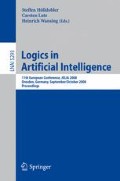Abstract
Full linear-time hybrid logic (HL) is a non-elementary and equally expressive extension of standard LTL + past obtained by adding the well-known binder operators ↓ and ∃. We investigate complexity and succinctness issues for HL in terms of the number of variables and nesting depth of binder modalities. First, we present direct automata-theoretic decision procedures for satisfiability and model-checking of HL, which require space of exponential height equal to the nesting depth of binder modalities. The proposed algorithms are proved to be asymptotically optimal by providing matching lower bounds. Second, we show that for the one-variable fragment of HL, the considered problems are elementary and, precisely, Expspace-complete. Finally, we show that for all 0 ≤ h < k, there is a succinctness gap between the fragments HL k and HL h with binder nesting depth at most k and h, respectively, of exponential height equal to k − h.
Access this chapter
Tax calculation will be finalised at checkout
Purchases are for personal use only
Preview
Unable to display preview. Download preview PDF.
References
Areces, C., Blackburn, P., Marx, M.: Hybrid logics: Characterization, interpolation and complexity. J. Symb. Log. 66(3), 977–1010 (2001)
Bozzelli, L., Lanotte, R.: Complexity and Succinctness issues for linear-time hybrid logics. Technical report (2008), http://dscpi.uninsubria.it/staff/Bozzelli
Blackburn, P., Seligman, J.: What are hybrid languages? In: Kracht, de Rijke, Wansing, Zakharyaschev (eds.) Advances in Modal Logic, vol. 1, pp. 41–62. CSLI Publications (1998)
Buchi, J.R.: On a decision method in restricted second order arithmetic. In: Proc. Internat. Congr. Logic, Method. and Philos. Sci., Stanford, pp. 1–12 (1960)
ten Cate, B., Franceschet, M.: On the complexity of hybrid logics with binders. In: Ong, L. (ed.) CSL 2005. LNCS, vol. 3634, pp. 339–354. Springer, Heidelberg (2005)
Demri, S., Schnoebelen, Ph.: The complexity of propositional linear temporal logics in simple cases. Information and Computation 174(1), 84–103 (2002)
Franceschet, M., de Rijke, M.: Model checking hybrid logics (with an application to semistructured data). J. Applied Logic 4(3), 279–304 (2006)
Franceschet, M., de Rijke, M., Schlingloff, B.H.: Hybrid logics on linear structures: Expressivity and complexity. In: Proc. 10th TIME, pp. 166–173. IEEE Computer Society Press, Los Alamitos (2003)
Goranko, V.: Hierarchies of modal and temporal logics with reference pointers. Journal of Logic, Language and Information 5(1), 1–24 (1996)
Miyano, S., Hayashi, T.: Alternating finite automata on ω-words. Theoretical Computer Science 32, 321–330 (1984)
Pnueli, A.: The temporal logic of programs. In: Proceedings of the 18th IEEE Symposium on Foundations of Computer Science, pp. 46–57 (1977)
Safra, S.: On the complexity of omega-automata. In: Proc. 29th FOCS, pp. 319–327 (1988)
Sistla, A.P., Clarke, E.M.: The complexity of propositional linear temporal logics. Journal of the ACM 32(3), 733–749 (1985)
Stockmeyer, L.J.: The complexity of decision problems in automata theory and logic. Ph.D. thesis, Department of Electrical Engineering. MIT, Cambridge (1974)
Schwentick, T., Weber, V.: Bounded-variable fragments of hybrid logics. In: Thomas, W., Weil, P. (eds.) STACS 2007. LNCS, vol. 4393, pp. 561–572. Springer, Heidelberg (2007)
Vardi, M.Y.: A temporal fixpoint calculus. In: Proc. 15th Annual POPL, pp. 250–259. ACM Press, New York (1988)
Author information
Authors and Affiliations
Editor information
Editors and Affiliations
Rights and permissions
Copyright information
© 2008 Springer-Verlag Berlin Heidelberg
About this paper
Cite this paper
Bozzelli, L., Lanotte, R. (2008). Complexity and Succinctness Issues for Linear-Time Hybrid Logics. In: Hölldobler, S., Lutz, C., Wansing, H. (eds) Logics in Artificial Intelligence. JELIA 2008. Lecture Notes in Computer Science(), vol 5293. Springer, Berlin, Heidelberg. https://doi.org/10.1007/978-3-540-87803-2_6
Download citation
DOI: https://doi.org/10.1007/978-3-540-87803-2_6
Publisher Name: Springer, Berlin, Heidelberg
Print ISBN: 978-3-540-87802-5
Online ISBN: 978-3-540-87803-2
eBook Packages: Computer ScienceComputer Science (R0)

